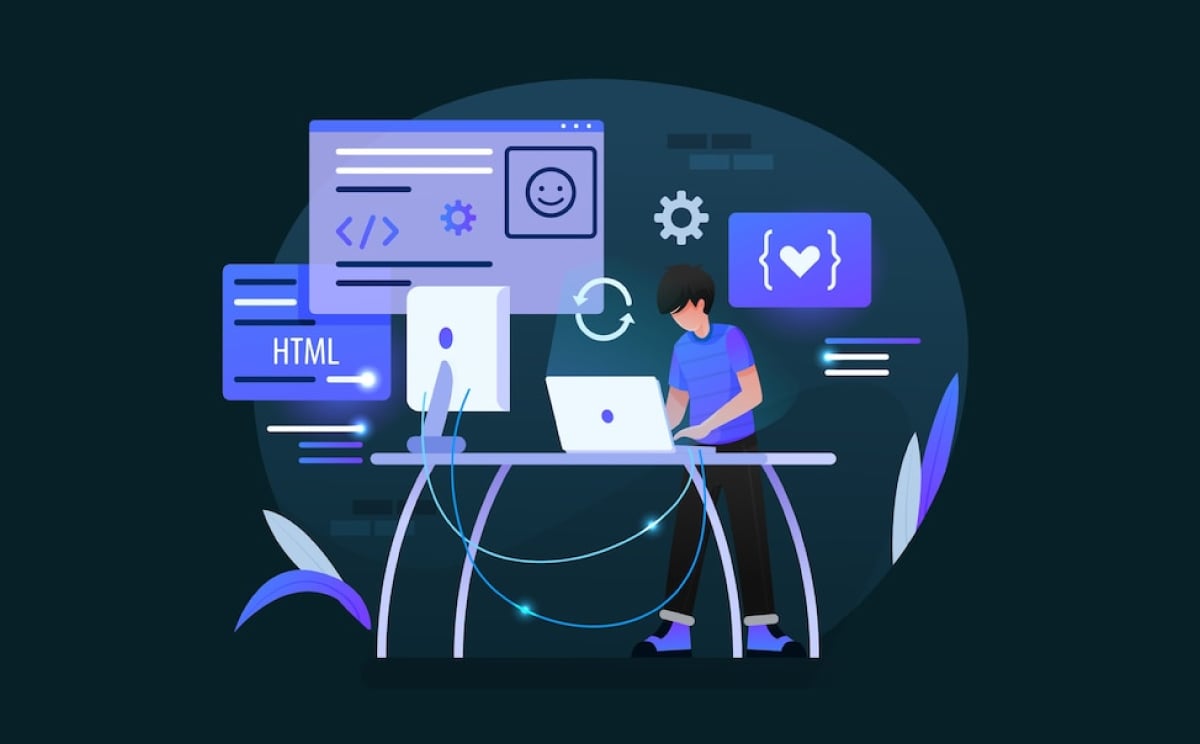It goes without saying that programmers are the backbone of today’s digital economy. For instance, during the last three years, the tech sector added $1.9 trillion to the U.S. economy, largely driven by software and web development. Yet, among the jargon and the buzzwords, the essence of a programmer’s role remains an enigma for many. What exactly does a career in programming mean? How does a typical day unfold in the life of a programmer? What skills and qualifications are necessary to stride into this field?
If you’ve ever asked yourself these questions, you’ve landed in the right place. Below, we’ll unravel the mysteries of a programmer’s world. Read on as we journey into the heart of coding, algorithms, and problem-solving to discover what it truly means to be a programmer.
What Does a Programmer Do?
Programmers play a vital role in the realm of software development. They conceptualize, design, write, and test code that brings the software to life. Collaborating closely with different stakeholders, programmers constantly enhance and improve the product, making their careers highly demanding and rewarding for those with logic, problem-solving skills, and a touch of creativity.
A Day in the Life: What Does a Regular Day Look Like for a Programmer?
Programmers often start their day with a meeting to set the day’s goals or to discuss progress with the team. The core of their day is spent writing and reviewing code, debugging, and problem-solving. They interact with other programmers, project managers, and clients to better understand requirements and provide timely updates.
Despite the occasional late nights, programmers have a well-structured work-life balance and often spend time learning about new programming tools.
Programmer Role and Responsibilities
The roles and responsibilities of a programmer vary widely across organizations and largely depend on the specific job title and career stage. They can be seen crafting algorithms, designing user interfaces, managing databases, or leading software development teams.
Here are some of the major factors that determine a programmer’s roles and responsibilities:
Based on Company Size
The size and scale of a company can influence a programmer’s responsibilities. Let’s explore how the nature of a programmer’s work varies from startups to mid-sized and large companies.
At Startups
At startups, programmers are part of a dynamic work environment, often adapting rapidly to changes. Programmers at startups often wear multiple hats, responsible for coding and understanding business requirements, user interface design, and sometimes even testing. They frequently engage with founders or other business stakeholders and are usually part of the entire software development lifecycle.
At Mid-Sized Companies
With mid-sized companies, a programmer’s role becomes more specialized, focusing on a particular aspect of software development, like front-end, back-end, or database management. While they still participate in broader project discussions, they generally have defined responsibilities and work as part of a larger team.
At Large Companies
At large companies, programmers have highly specialized roles within larger, well-defined teams. They may focus intensely on one specific project area, like optimizing an algorithm or designing a microservice. The work pace can be slower, with a strong emphasis on planning, documentation, and compliance with established coding standards and practices.
Based on Career Stage
A programmer’s role also changes significantly as they progress in their career. Let’s see how their responsibilities evolve from entry-level to senior positions.
Entry-Level
Entry-level programmers spend most of their day writing code, with tasks usually clearly defined by senior team members.
They focus on learning—understanding the codebase, familiarizing themselves with the company’s workflows, and refining their coding skills. Active mentoring is common, and their work is regularly reviewed for quality.
Mid-Level
Mid-level programmers take on more complex coding tasks, designing system components or solving problems. They begin taking on leadership responsibilities, like guiding junior software developers and contributing to design and planning discussions. Their work involves more significant interaction with non-technical teams and clients.
Senior
Compared to junior and mid-level programmers, senior programmers lead project segments or entire teams, contributing to strategic decisions about the software’s architecture and technologies.
While they still code, their role also includes mentoring junior programmers, reviewing code, and troubleshooting critical issues. They liaise between management and the technical team, translating business requirements into technical strategies.
General Requirements for a Programming Career
Programmers come from various backgrounds, each with a unique path into the field. There’s no definitive roadmap to becoming one, but there are common paths that many aspiring programmers navigate. Here are a few general requirements for a fruitful career:
Education
While formal education is valuable in laying a solid foundation, it’s not always necessary for a programming career. Computer science, software engineering, and information systems are common programming degrees that provide a solid theoretical understanding. Nonetheless, today’s tech industry values practical skills over anything else.
There are numerous programming certifications and courses available that’ll help you acquire the skills you need to become a programmer. Bootcamps from reputable platforms like Coursera, edX, or Springboard can showcase your dedication and mastery of a particular programming language or methodology.
Skills
A successful programming career demands a combination of technical knowledge and soft skills, with each playing a pivotal role in the daily life of a programmer.
Technical Skills
Here are some essential technical skills every programmer should have:
- Knowledge of one or more programming languages (such as Python, Java, C#, or JavaScript)
- Understanding of data structures and algorithms
- Familiarity with version control systems (like Git)
- Knowledge of database management
- Understanding of network and security concepts
- Proficiency in debugging
- Basic knowledge of software development methodologies (like Agile or Scrum)
Soft Skills
Alongside technical knowledge, the following soft skills are critical for success:
- Effectively articulating technical concepts to non-technical team members
- Problem-solving skills
- Attention to detail
- Time management and balancing multiple tasks
- Teamwork
Experience
Employers want to see that you have worked on real projects and have a deep understanding of programming concepts and techniques. Previous roles at other companies, freelance projects, or open-source projects can all contribute to building a powerful portfolio that showcases your programming skills. For example, you can create a personal blogging platform or website that demonstrates your experience creating various functionalities such as user authentication, building a search functionality, and a complex comments system. You can explain how you built these using both frontend and backend technologies such as React or Node.js.
These experiences demonstrate your technical skills and ability to problem-solve and work on real-world projects. To enhance your credibility and attractiveness to potential employers, showcase your projects—especially those that solved real-world problems.
Other Prerequisites
Broadening your horizons beyond traditional routes is highly beneficial. Volunteering for tech nonprofits, undertaking internships, or even developing personal projects can add value to your resume. These opportunities allow you to gain new skills, work on different projects, and collaborate with diverse teams.
Versatility and adaptability are often underrated but are very important in the world of programming. They can set you apart in this dynamic landscape, demonstrating that you are proactive in your professional development and can adapt to new challenges and technologies.
Get To Know Other Software Engineering Students
Jason McGinty
Full-stack Systems Engineer at Technicity
Promise Morka
Software Engineer at AECOM
Oscar Herrera
Student In The Software Engineering Bootcamp at Springboard
Who Should Consider a Career in Programming?
Programming is a fascinating field that bridges creativity and logic, but it isn’t for everyone. Before plunging into this career path, consider various factors such as your interest in technology, problem-solving abilities, patience for debugging, and desire for continuous learning.
Programming Is for You if…
…you enjoy problem-solving, have a knack for logic and algorithms, and find satisfaction in building functional and efficient systems. If you’re naturally curious and love digging into the complexity of how things work, programming offers an endless canvas to satiate your curiosity. The field also suits those who thrive in a dynamic environment and are ready to continually update their analytical skills in line with technological advancements.
Programming Is Not for You if…
…you’re not fond of continuous learning or feel frustrated by complex problems and details. If sitting in front of a computer for extended periods seems draining, or if dealing with occasional failures and debugging doesn’t appeal to you, then programming might be challenging. This career demands patience, resilience, and a willingness to iterate and improve continuously—traits not everyone possesses.
Programming Career Opportunities To Explore
Programming opens doors to a wide array of similar and interconnected career opportunities.
For instance, if you enjoy problem-solving and design, you might consider becoming a software engineer, where you’ll work on designing and building software systems. If data intrigues you, careers in data science or database management could be fulfilling, allowing you to work with large data sets and drive decision-making.
A career in technical writing or business analysis might be suitable for those with strong communication skills and a knack for understanding user needs. Meanwhile, individuals with a keen eye for design and user experience might find a rewarding career in UI/UX design. It’s worth remembering that these fields often intersect, and skills learned in one area can be highly beneficial in another.
Programmer vs. Coder vs. Software Engineer: What’s the Difference?
Though these titles have different implications, in practice, they are often used interchangeably.
A coder is like a musician playing notes on an instrument. They are specialists who write code in various programming languages. They might not always understand the bigger picture of how their code fits into larger systems but can write functional pieces of code that can be used later on.
On the other hand, software programmers understand how different pieces of code fit together to create software. They have a broader understanding of software programs and can solve complex problems through code.
Lastly, software engineers design and orchestrate entire systems, understanding how each part interacts with the others. They apply engineering principles to the software development process, including planning, developing, and maintaining software systems.
What Does a Programmer Do: Real-Life Examples To Learn From
Let’s put theory into perspective and dive into the practical world of programming. Here are two real-life examples that offer lessons and tangible experiences from programmers who have explored this career path.

This Reddit thread exemplifies how different people experience their careers as programmers. Some programmers may spend more time on certain activities than others—for instance, freelance programmers spend way more time on administrative tasks, while a programmer working in a startup spends more time writing code and learning new technologies.
Cem Eygi

In this article, Cem Eygi gives us a detailed look into a programmer’s daily routine working in a company. He emphasizes that programming is not just about writing code but also involves teamwork, problem-solving, and continuous learning. The article also highlights the importance of communication and collaboration in a programming team.
FAQs About Being a Programmer
We answer your most frequently asked questions.
Is Programming a Good Career?
Programming is a promising, rewarding career, both intellectually and financially. It offers a unique blend of creative and analytical work, as you’ll solve complex problems and create meaningful software applications.
This field also provides numerous opportunities for continuous learning and career advancement.
Where Can a Programmer Work?
Programmers have the flexibility to work across many different industries and environments. They can be found in tech companies, startups, financial institutions, healthcare organizations, government agencies, and more. Any industry that relies on software, in one way or another, requires programmers.
Also, with the rise of remote work, many programmers can work from anywhere in the world, offering a great deal of flexibility.
What Is the Average Salary for a Programmer?
The annual salary for a programmer can vary greatly depending on factors like location, level of experience, specialization, and the industry they work in. As of 2023, in the United States, the average salary for a programmer is around $91,369 per year. This figure can be much higher in high-demand areas or for certain specialized roles.
Does Programming Require Math?
While maths provides a good foundation for logical thinking, you don’t necessarily need advanced math skills for most programming jobs.
Basic arithmetic and a grasp of algebra are often sufficient. Certain areas of programming, such as data science, machine learning, or algorithmic programming, may require a deeper understanding of mathematics, like calculus or statistics. It depends on what kind of programming you plan to do.
Since you’re here…
Were you one of the tens of thousands of workers impacted by this year’s tech layoffs? Springboard wants to help. Our new Career Reboot Scholarship is intended to assist job seekers from tech looking to upskill, reskill and stand out in a competitive hiring environment. Get $1,000 off any Springboard bootcamp in software engineering, data analytics, UX design, cybersecurity, tech sales, and more. Visit this page for eligibility requirements and to apply.






